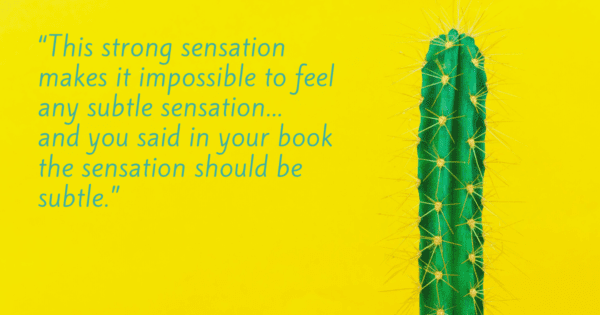Emotions that are Hard to be in Presence With
~~~~~~~~~~~~~~~~~~~~~~~~~~~~~~~~~~~~~~~~~~
Ruth writes: "I wonder if you have any insights into why some emotions, for example maybe anger, seem harder to come into Presence with. It’s like they have a sticky quality, pulling me to merge or identify with them."
Dear Ruth,
Actually, yes, I do have an insight on why some emotions and particularly anger are often hard to come into Presence with.
It’s because emotions are in many ways the opposite of felt sensing, and for good reason. Gene Gendlin writes about this in his fascinating article, On Emotion in Therapy, which you can read here.
Gendlin writes: "The cat’s body ongoingly senses many things around it. It explores each thing, and hears the slightest noise. But at certain cues (for example, a strange cat on its territory) the cat’s body suddenly gets ready to fight. There is a huge physical change: Its tail is suddenly thick, its heart pounds, and the cat hisses. Its whole body is taut. Now it ignores much of the surroundings to which it usually attends so sensitively. Only with difficulty could its attention be distracted from the other cat. The scope of its attention is narrowed."
In other words, the cat has the ability to do a kind of wide sensing, taking in a lot from many directions, but when there is a need to ready for a fight, or a hunt, the cat’s attention narrows so that most of the resources of attention are focused on the threatening or threatened object.
Gendlin’s point is that emotions–and I would think especially anger and fear– do this narrowing for us. For good reason: if there is a threat, as animals (and of course we ARE animals too) we need that narrowing of attention.
But Focusing, in Presence, is the opposite of that. Focusing is a widening of attention. We step back into Presence to get a whole sense, a larger contextual view. No wonder it’s harder to do that when something in us is angry!
Shift Your Language to Shift Your Attention
~~~~~~~~~~~~~~~~~~~~~~~~~~~~~~~~~~~~~~~~~~
One thing I would suggest is to be wary of words like "anger" and "fear." Other examples: "resentment," "disappointment," "sadness." Using NOUNS for emotions makes it harder to be with them in a way that helps them to process forward.
The word "emotion" is based on the root of "motion." Emotions are meant to move and change. But nouns are generally words that describe things, entities, and as such we don’t think of them as changing. If you call it "my fear," or "my anger," it’s hard to conceive of it changing.
Suggestion: Say instead, "Something in me is afraid," or "Something in me is angry." Change "resentment" to "resentful," "disappointment" to "disappointed," "sadness" to "sad."
If you’re a healing professional working with a client, and your client says, "I’m feeling so much fear," try saying back, "You’re sensing something in you that’s afraid." In most cases the relief will be immediate. "Oh, it’s not all of me!" The shift in language from nouns to adjectives, for emotions, lets us take that wider perspective, being with not caught up in, that Focusing needs.








So by using an adjective for emotions, that would automatically lead us to a felt sense so we can start Focusing on something deeper than an emotion?